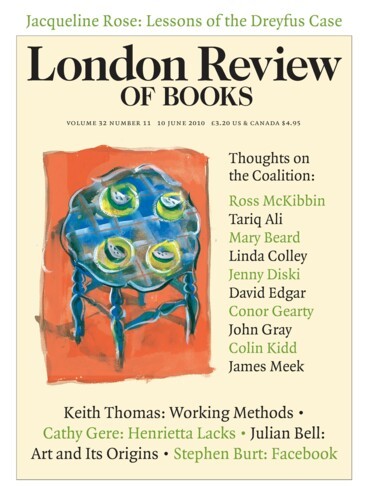The election of Ed Miliband as leader of the Labour Party is surely not as surprising as much of the media suggests it was. He may have started at the back of the pack five months ago but any half-serious candidate to the left of David Miliband had a good chance. Diane Abbott, who is definitely to the left of David, was not a serious candidate, and Ed Balls, who is probably to his left, could not escape from his relationship with Gordon Brown. What’s really surprising is that David should be thought to have been an inevitable successor to Brown.
Ross McKibbin
Ross McKibbin is an emeritus research fellow at St John’s College, Oxford.
After two weeks of negotiation Australia finally has a government: a Labor government with a majority of one as long as the Green MP and three of the independents continue to support it. All this contrasts strikingly with British experience where the present coalition was negotiated in a couple of days. One reason for this is that Labour was never a serious negotiator in Britain whereas in Australia both Labor and non-Labor were. Another is that three of the independents are former members of the rural wing of the conservative coalition who represent constituencies that would normally return MPs from that wing. (The two who declared for Labor earlier hold seats that would usually be Labor.) They all, however, are maverick figures who seriously quarrelled with the conservatives and have sympathies with some of Labor’s traditions. And they don’t simply want barrels of pork for their constituents. They could not, therefore, be expected to make up their minds quickly. How long such an arrangement can last and how stable it will be is almost impossible to say – though it would be surprising if the independents had not secured a guarantee that the prime minister, Julia Gillard, will not attempt an opportunist premature election.
The difficulties of coalition government have probably manifested themselves first in university ‘policy’. The previous regime made funding proposals that could hardly be taken seriously but recent comments by the new universities minister, David Willetts, suggest someone equally at sea. The problem is that the coalition is committed to contradictory aims. It wants to encourage social mobility, give increased access to working-class students and more monetary assistance to those students (Lib Dem policy), and to rebalance universities towards teaching (a good thing) and the ‘student experience’ (a non-thing), away from the old obsession with research. But it also wants – above all – to cut spending. This is where the trouble starts.
Time to Repent: The New Political Settlement
Ross McKibbin, 10 June 2010
Labour now has time to repent at leisure. What should it do? Disowning its immediate past would be a good first step, but it has to elect a new leader and all the serious candidates are heavily implicated, for better or worse, in the New Labour ‘project’. One thing it is in no danger of doing is retreating into socialist rhetoric of the early 1980s variety, which is a relief. It could, of course, do nothing, since as the only opposition party it might expect to be the inevitable beneficiary of the coalition’s unpopularity. That would be risky. The coalition need not become unpopular, and even if it does the smaller parties could also benefit. Rather, Labour should emphasise the extent to which it is the party of public provision and collective life. It should also accept that the obsession with choice was a dead end.
Gordon Brown has at the last minute and too late been converted to the alternative vote (AV) as a method of election to the House of Commons. AV preserves single-member constituencies but ensures that the winning candidate must win at least 50 per cent of the votes plus one. As many have noted, it is the way the lower houses of Australian parliaments are elected. By itself it is a minimal reform, better than nothing but something the Lib Dems would regard as merely a first step. What no one has pointed out is that the upper houses of all Australian parliaments (except Queensland which abolished its upper house) are elected by forms of proportional representation (PR). In Australia the two go together: AV for the lower house and some form of PR for the upper have emerged historically as a single electoral system, the one complementing the other, and Australian political parties have been surprisingly willing to forgo short-term political advantage in order to secure it.
Pieces about Ross McKibbin in the LRB
Blame Lloyd George: England 1914-51
W.G. Runciman, 27 May 2010
When Oxford University Press commissioned Ross McKibbin to write the volume in the New Oxford History of England covering the years 1918 to 1951, they got more than they bargained for. McKibbin...
Mister Sheppard to you: Classes and Cultures: England 1918-51 by Ross McKibbin
R.W. Johnson, 21 May 1998
Ross McKibbin’s remarkable study of the way the cultures of class shaped English society has, at a stroke, changed the historiographical landscape. One learns more about almost any aspect...
Ross McKibbin and the Rise of Labour
W.G. Runciman, 24 May 1990
In 1984, Ross McKibbin published an article in the English Historical Review called ‘Why was there no Marxism in Great Britain?’ His choice of title was a deliberate invocation of the...
Read anywhere with the London Review of Books app, available now from the App Store for Apple devices, Google Play for Android devices and Amazon for your Kindle Fire.
Sign up to our newsletter
For highlights from the latest issue, our archive and the blog, as well as news, events and exclusive promotions.


